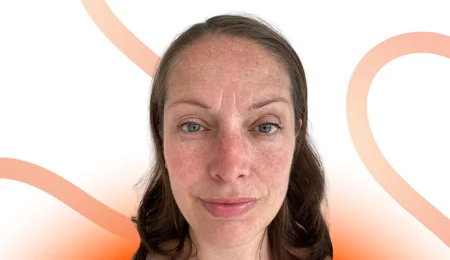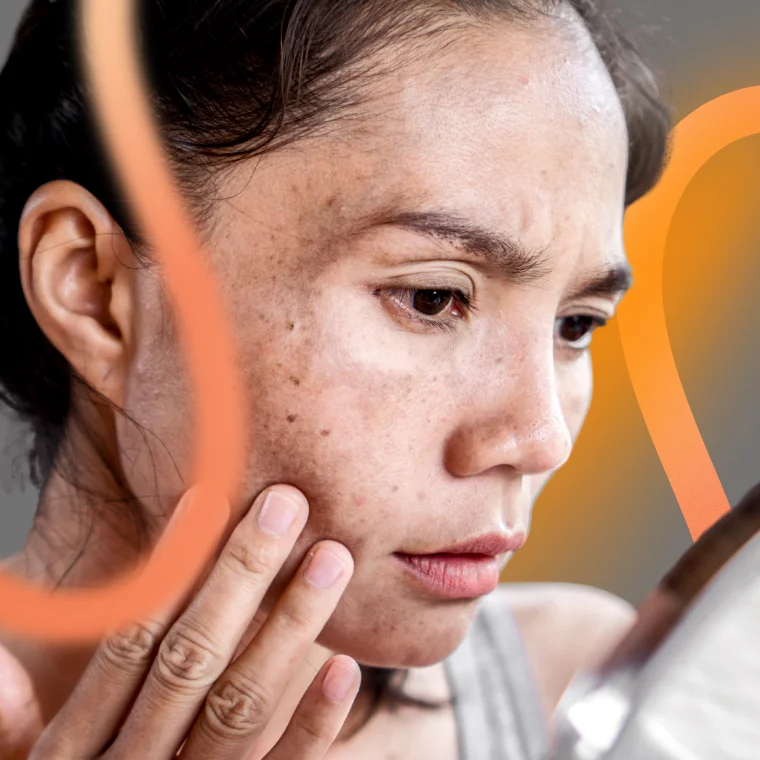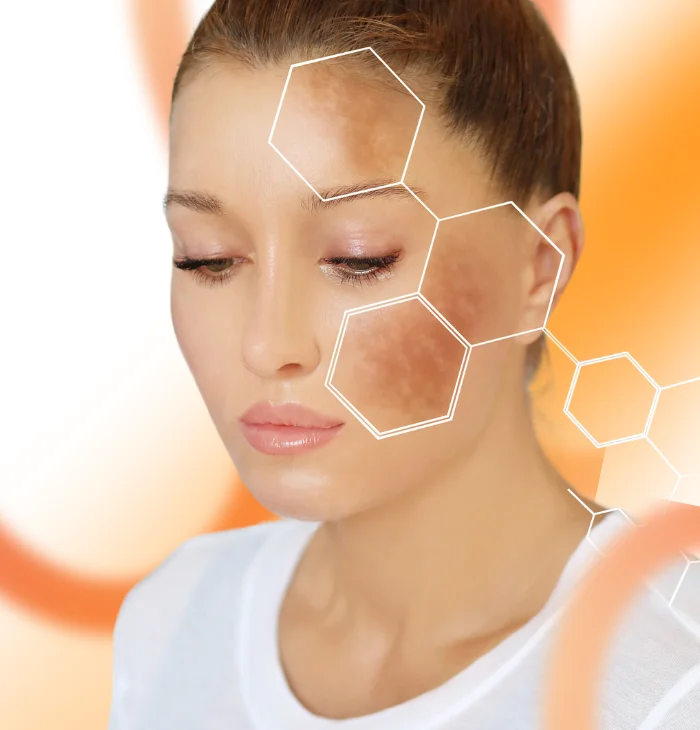

PIGMENTATION & MELASMA CORRECTION
Advanced Pico laser technology to target unwanted pigmentation and improve skin clarity.
From AED 2,500
Addresses sun spots, age spots, PIH
Helps manage melasma appearance
Improves overall skin tone
Utilizes advanced Pico Laser technology
You can pay with  and
and 
Unwanted pigmentation, such as sun spots, age spots, dark marks from past acne (PIH), or the complex condition of melasma, can affect skin clarity and confidence. These concerns are often difficult to resolve effectively with topical creams alone, requiring advanced treatment approaches.
At elegant hoopoe clinic, we utilize advanced Pico laser technology, offering a targeted approach to break down excess pigment and help restore a more even, radiant complexion under the care of licensed professionals.

Utilizing ultra-short laser pulses that primarily use a photoacoustic effect to shatter pigment, potentially reducing heat transfer compared to older lasers.
Careful evaluation of your skin type and pigmentation concern (sun spots, PIH, melasma characteristics) by licensed staff to create a suitable treatment plan.
Treatments performed by trained professionals focusing on appropriate settings to target pigment effectively while considering skin safety.
Identify pigment type, assess skin suitability, discuss realistic outcomes (especially for melasma), and plan the treatment course.
Laser applied to targeted areas – feels like quick, warm snaps. Multiple sessions are typically required.
Strict sun protection is crucial. Results appear gradually over the course.



Sun spots, age spots, freckles, PIH (post-acne marks), and it can help manage melasma appearance.
Its ultra-short pulses shatter pigment into tiny particles, allowing the body’s natural processes to clear them over time.
It can be part of a melasma management plan, but melasma is complex and requires expert assessment and careful treatment strategy.
Most clients find it tolerable, often described as quick, warm snaps. Numbing cream is generally not needed.
Usually 3-6 sessions, spaced several weeks apart, depending on the type and severity of pigmentation.
Minimal downtime. Some temporary redness or darkening of spots may occur before fading. Sun protection is essential.
Gradual fading occurs over weeks to months after each session. Multiple treatments yield more noticeable results. Results vary.
Treated spots can clear significantly, but new pigmentation can form with sun exposure. Melasma may recur. Sun protection is key for maintenance.
Strict sun avoidance and daily use of high-SPF broad-spectrum sunscreen are crucial. Follow clinician’s advice.
All laser treatments are performed by our trained and licensed medical professionals or laser technicians.

Our licensed medical professionals and technicians perform all energy-based treatments safely and effectively.
{
“@context”: “https://schema.org”,
“@graph”: [
{
“@type”: “MedicalBusiness”,
“@id”: “https://eleganthoopoe.ae/#localbusiness”,
“name”: “elegant hoopoe”,
“image”: “https://eleganthoopoe.ae/static/assets/img/elegant-logo-dark.webp”,
“url”: “https://eleganthoopoe.ae/”,
“telephone”: “+971505083677”,
“priceRange”: “$$$”,
“address”: {
“@type”: “PostalAddress”,
“streetAddress”: “401b, Jumeirah 2, Jumeirah”,
“addressLocality”: “Dubai”,
“addressRegion”: “Dubai”,
“postalCode”: “566750”,
“addressCountry”: “AE”
},
“geo”: {
“@type”: “GeoCoordinates”,
“latitude”: “25.1944834”,
“longitude”: “55.2354055”
},
“openingHours”: “Mo-Su 09:00-23:00”,
“sameAs”: [
“https://www.instagram.com/eleganthoopoe/”,
“https://www.linkedin.com/company/elegant-hoopoe/”,
“https://www.youtube.com/@elegant.hoopoe”,
“https://www.snapchat.com/add/eleganthoopoe”,
“https://www.tiktok.com/@eleganthoopoe”,
“https://t.me/ElegantHoopoeClinic”,
“https://www.facebook.com/eleganthoopoe.uk”
]
},
{
“@type”: “MedicalProcedure”,
“@id”: “https://eleganthoopoe.ae/services/advanced-skin-treatments/pigmentation-melasma-correction/#service”,
“name”: “Pigmentation & Melasma Correction in Dubai”,
“description”: “Address sun spots, age spots, melasma & pigmentation in Dubai with Pico Laser. Advanced treatment for clearer, even-toned skin at elegant hoopoe.”,
“url”: “https://eleganthoopoe.ae/services/advanced-skin-treatments/pigmentation-melasma-correction/”,
“image”: “https://eleganthoopoe.ae/wp-content/uploads/2024/10/melasma-2-jpg.webp”,
“procedureType”: {
“@type”: “MedicalProcedureType”,
“name”: “Pigmentation Correction Treatment”
},
“medicalSpecialty”: {
“@type”: “MedicalSpecialty”,
“name”: “Dermatology”
},
“bodyLocation”: “Skin”,
“provider”: {
“@id”: “https://eleganthoopoe.ae/#localbusiness”
},
“areaServed”: {
“@type”: “City”,
“name”: “Dubai”
},
“availableChannel”: {
“@type”: “ServiceChannel”,
“serviceUrl”: “https://eleganthoopoe.ae/services/advanced-skin-treatments/pigmentation-melasma-correction/”,
“servicePhone”: {
“@type”: “ContactPoint”,
“telephone”: “+971505083677”,
“contactType”: “Customer Support”
}
},
“offers”: [
{
“@type”: “Offer”,
“itemOffered”: {
“@type”: “MedicalProcedure”,
“name”: “Pico Laser Pigment Removal Session”,
“description”: “Advanced Pico laser session to target unwanted pigmentation like sun spots, age spots, Post-Inflammatory Hyperpigmentation (PIH), and to help manage melasma for a clearer, more even skin tone.”,
“procedureType”: { “@type”: “MedicalProcedureType”, “name”: “Laser Pigmentation Removal” },
“instrument”: {
“@type”: “MedicalDevice”,
“name”: “Pico Laser”
},
“image”: “https://eleganthoopoe.ae/wp-content/uploads/2025/05/body-contouring-trusculpt.webp”
},
“price”: “2500”,
“priceCurrency”: “AED”,
“url”: “https://eleganthoopoe.ae/services/advanced-skin-treatments/pigmentation-melasma-correction/”,
“availability”: “https://schema.org/InStoreOnly”,
“seller”: {
“@id”: “https://eleganthoopoe.ae/#localbusiness”
}
}
]
}
]
}